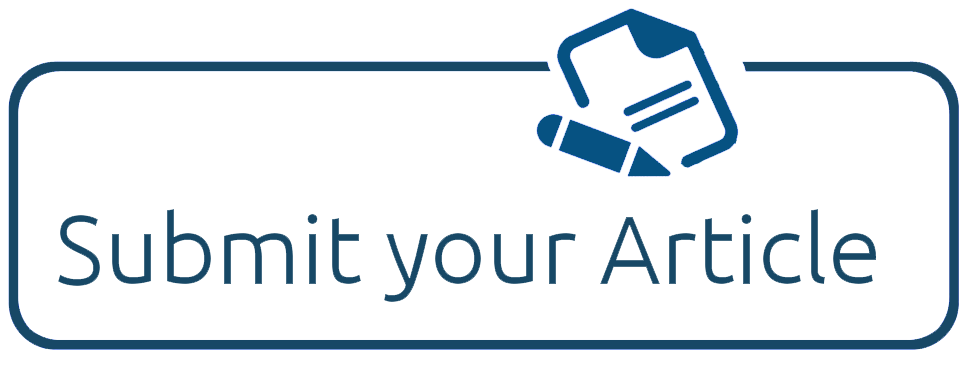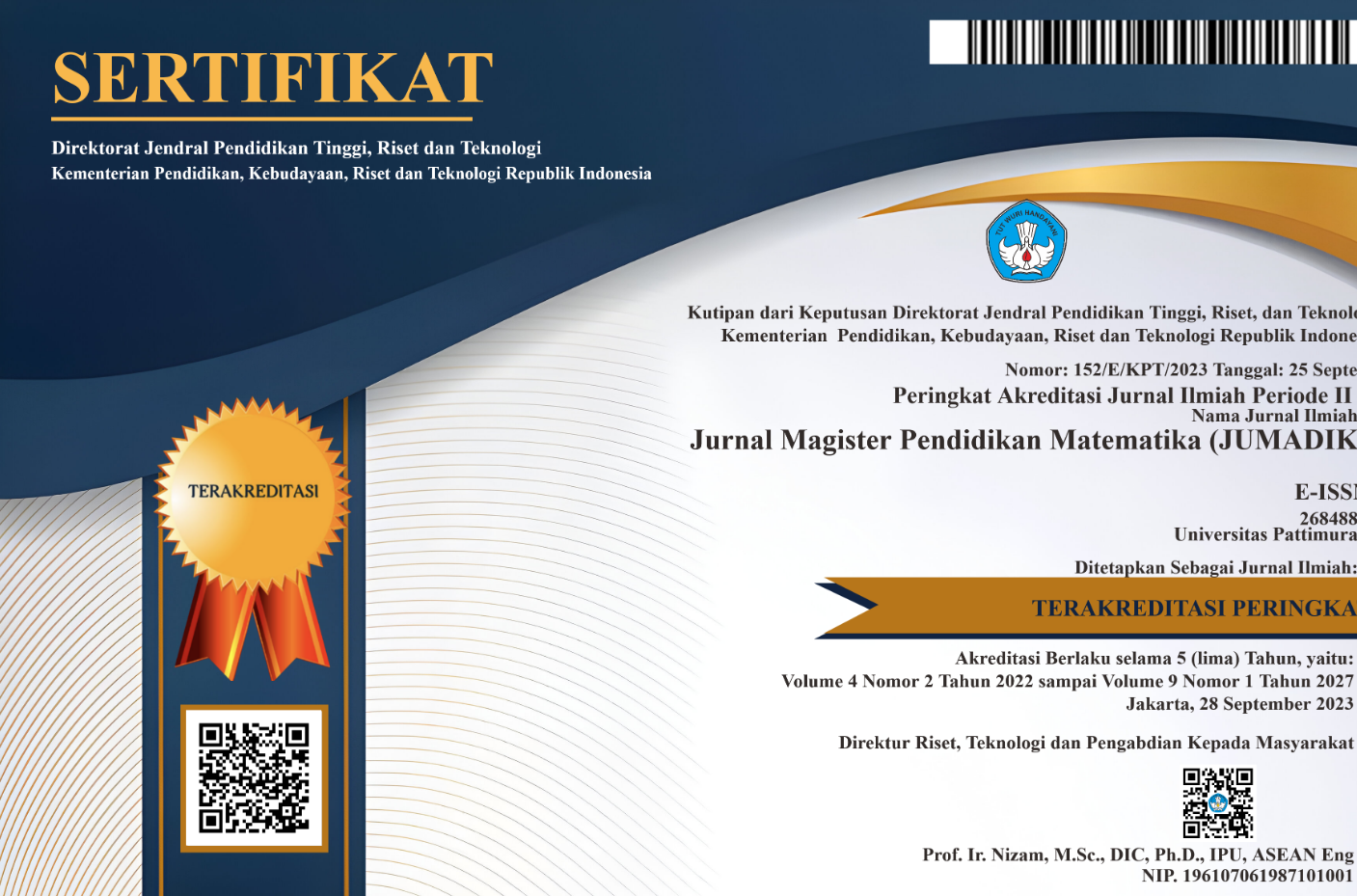ANALISIS LITERASI DIGITAL GURU MATEMATIKA MTSN 1 KUTAI KARTANEGARA
Abstract
This study aims to determine the digital literacy of MTsN 1 Kutai Kartanegara mathematics teachers in preparing questions in mathematics learning. This research is a descriptive qualitative research. The subjects of this research are mathematics teachers including VII, VIII, and IX grade teachers at the school. The object of this research is the digital literacy of mathematics teachers. Data were collected through questionnaires, interviews, and documentation. Data analysis in this study was carried out using three stages, which are data reduction, data presentation, and conclusion drawing. The results showed that the digital literacy of mathematics teachers at MTsN 1 Kutai Kartanegara was categorized as capable in preparing questions in mathematics learning. In terms of teacher capabilities, they are capable in aspects of internet searching, content evaluation, and knowledge assembly. Although, in the aspect of hypertextual navigation they are still less capable
Downloads
References
Anggeraini, Y., Faridi, A., Mujiyanto, J., & Bharati, D. A. L. (2019). Literasi Digital: Dampak dan Tantangan dalam Pembelajaran Bahasa. Seminar Nasional Pascasarjana 2019. https://proceeding.unnes.ac.id/index.php/snpasca/article/view/313/342..
Badan Kepegawaian Negara. (2019). Statistik PNS per Desember 2018: Tenaga Guru dan Kesehatan Menjadi Fokus Pemenuhan Kebutuhan ASN. Badan Kepegawaian Negara.
Eshet, Y. (2002). Digital Literacy: A New Terminology Framework and Its Application to the Design of Meaningful Technology-Based Learning Environments. ED-MEDIA 2002 World Conference on Educational Multimedia, Hypermedia & Telecommunications Proceedings, 1–7. https://www.learntechlib.org/
primary/p/10316/.
Federal Communications Commission. (2010). Connecting America: The National Broadband Plan. Washington DC: Federal Communications Commission.
Gilster, P. (1997). Digital Literacy. New York: Wiley Computer Pub.
Katadata Center Insight, & Kominfo. (2020). Survei Literasi Digital Indonesia 2020. Katadata Insight Center.
Kharisma, H. V. (2017). Literasi Digital di Kalangan Guru SMA di Kota Surabaya. Libri-Net, 6(4), 31–32. http://journal.unair.ac.id/LN@literasi-di
gital-di-kalangan-guru-sma-di-kota-surabaya-art
icle-11748-media-136-category-.html.
Kominfo. (2022). Budaya Digital Membaik, Indeks Literasi Digital Indonesia Membaik. Kementerian Komunikasi dan Informatika (Kominfo).
Law, N., Woo, D., Torre, J. D. L., & Wong, G. (2018). A Global Framework of Reference on Digital Literacy Skills for Indicator 4.4.2 (Information Paper No. 51, p. 146). Montreal: UNESCO Institute for Statistics.
Levy, L. A. (2018). 7 Reasons Why Digital Literacy is Important for Teachers. University of Southern California Rossier.
Martin, A. (2005). DigEuLit – a European Framework for Digital Literacy: a Progress Report. Journal of eLiteracy, 2, 130–136. https://doi.org/10.182
/ISSN1891-943X-2006-02-06.
Nahdi, D. S., & Jatisunda, M. G. (2020). Analisis Literasi Digital Calon Guru SD dalam Pembelajaran Berbasis Virtual Classroom di Masa Pandemi COVID-19. Jurnal Cakrawala Pendas, 6(2), 116–123. https://doi.org/10.31949/
jcp.v6i2.2133.
Negara, B. D. P. (2020). Kompetensi Literasi Digital Guru di Sekolah Menengah Atas Negeri Kota Solok. Skripsi. Surabaya: Universitas Airlangga.
Novitasari, Y., & Fauziddin, M. (2022). Analisis Literasi Digital Tenaga Pendidik pada Pendidikan Anak Usia Dini. Jurnal Obsesi: Jurnal Pendidikan Anak Usia Dini, 6(4), 3570–3577. https://doi.org/10.31004/obsesi.v6i4.2333.
Oktavia, E. D. (2021). Analisis Literasi Digital Guru SDN 1 Palembang dalam Pembelajaran Daring pada Masa Pandemi COVID-19. Skripsi. Palembang: Universitas Sriwijaya.
Rikawati, K., & Sitinjak, D. (2020). Peningkatan Keaktifan Belajar Siswa dengan Penggunaan Metode Ceramah Interaktif. Journal of Educational Chemistry, 2(2), 40–48. https://doi.org/10.21580/jec.2020.2.2.6059.
Rohmah, S. N., & Khasanah, U. (2020). Pelatihan Penyusunan Soal Matematika Berbasis Higher Order Thinking Skills (HOTS) bagi Guru-Guru SMP se-Kabupaten Bantul. Prosiding Seminar Nasional Hasil Pengabdian Kepada Masyarakat, 859–864. http://seminar.uad.ac.id/index.php/sen
imas/article/view/5704.
Wajdi, M., Akib, T., Natsir, M., Hasan, E., & Abidin. (2021). Hubungan Antara Kecakapan Literasi Digital dengan Kreativitas Mengajar Guru dalam Kegiatan Pembelajaran. Jurnal Riset dan Inovasi Pembelajaran, 1(3), 214–222. https://doi.org/10.51574/jrip.v1i3.259
Copyright (c) 2023 Irsya Faradisa, Zainuddin Untu, Sugeng Sugeng

This work is licensed under a Creative Commons Attribution-NonCommercial-ShareAlike 4.0 International License.
License and Copyright Agreement
In submitting the manuscript to the journal, the authors certify that:
- They are authorized by their co-authors to enter into these arrangements.
- The work described has not been formally published before, except in the form of an abstract or as part of a published lecture, review, thesis, or overlay journal. Please also carefully read Jurnal Magister Pendidikan Matematika (JUMADIKA) Posting Your Article Policy.
- That it is not under consideration for publication elsewhere,
- That its publication has been approved by all the author(s) and by the responsible authorities – tacitly or explicitly – of the institutes where the work has been carried out.
- They secure the right to reproduce any material that has already been published or copyrighted elsewhere.
- They agree to the following license and copyright agreement.
Copyright
Authors who publish with Jurnal Magister Pendidikan Matematika (JUMADIKA) agree to the following terms:
- Authors retain copyright and grant the journal right of first publication with the work simultaneously licensed under a Creative Commons Attribution-NonCommercial-ShareAlike 4.0 International License (http://creativecommons.org/licenses/by-nc-sa/4.0/) that allows others to share the work with an acknowledgment of the work's authorship and initial publication in this journal.
- Authors are able to enter into separate, additional contractual arrangements for the non-exclusive distribution of the journal's published version of the work (e.g., post it to an institutional repository or publish it in a book), with an acknowledgment of its initial publication in this journal.
- Authors are permitted and encouraged to post their work online (e.g., in institutional repositories or on their website) prior to and during the submission process, as it can lead to productive exchanges, as well as earlier and greater citation of published work.








